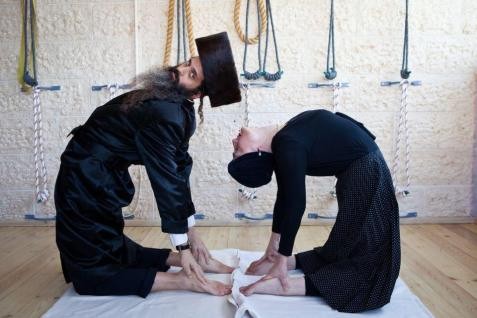
"So, how's the shul? When do you think you'll be ready for the next step in your career? How many years have you been there now?"
For those who know me, I've done a lot of teaching about cheese over the past year, related to my kashrut supervision, but I want to write about a different wedge of cheese today, the prize at the end of the rat-race.
Over the summer, I had the chance to attend several rabbinic gatherings and conventions, where important communal and spiritual matters were indeed discussed. But I wanted to draw attention to the more casual conversation. At one convention, I was asked some permutation of the lead question by some half a dozen well-intentioned colleagues, and that was just on the first day. As soon as I heard the question, I was bothered, but had to think about why.
The thoughts came quickly. "What does the next step mean? Surely, it means a more prominent or larger synagogue, or one with a larger budget, and presumably a larger salary, perhaps? But I'm happy where I am . . . I've established meaningful relationships. My wife and I are as happy as we've ever been. I have a constructive and loving relationship with my community, " I thought to myself. And then, the thoughts got broader, and rebellious, and defiant; "Religious service isn't supposed to about salary, or fame, or prominence. It's about people, and the Divine, and meaning, and community," I thought to myself.
Upon further reflection, I don't think that those colleagues (many of whom are my friends) who asked the question intended anything sinister by it; I'm sure I ask similarly toned questions on more than an occasional basis too. They, my colleagues, devote their lives to serving community. And if money were their aim, there are many more efficient means of acquisition than the rabbinate, generally speaking (It's important to note that I do feel Rabbis are adequately compensated, generally, and this is not a complaint or even a discussion about that topic). So why the question? My hypothesis is that our patterns of casual conversation have been shaped by our society's prevailing rat-race mentality, and that the modes of conversation subtly shape us in return.
Rats race through a maze, perhaps endlessly, perhaps for cheese, and so humans race through the busy maze placed in front of them, seeking our "cheese." Money, fame, validation, attention - different flavors, but a similar singularity of purpose. Whatever the aim, the problem, just to spell it out clearly, is at least threefold: a) Often, the aim at the end of our rat-race isn't, in fact, the single principle we'd choose to be controlling our lives if we were in control b) Because we're in an endless race, and can never get enough of the "fix," we're never fully satisfied, or happy, or present, and always at a baseline of partially anxious and planning for the next-stage. To my mind, this is the meaning and great wisdom behind R' Eliezer Hakappar's aphorism that "jealously, lust, and the pursuit of honor remove a person from the world" (Pirkei Avot, Chapter 4); they're all consuming, never satisfied, and prevent appreciation of any station. c) There's a finite resource at the end of the race, and we're in competition with others to make sure there's cheese left over for us. A modified zero-sum game.
It's certainly not just a feature of rabbinic conversation. How often is improving the country conflated with a higher GDP? How often do we make important life decisions with an over-emphasis on the economic impact? Is the spiritual or interpersonal impact an equal or more primary component of our decision-making process? Perhaps, economics are more concretized. But perhaps, just perhaps, it's because money is the most common wedge of "cheese" at the end of our maze.
In the fall of 2015, I was at a wedding, and didn't know many people at our table (the newlyweds were friends of my wife from graduate school). Though our table consisted of people and couples in similar life situations, few knew each other. It occurred to me that the baseline mode of casual conversation in this setting was to inquire about career. "What do you do? I'm an engineer. I'm a graduate student. I'm in between jobs. Etc." But is career the only or main salient feature of life? It can be, but need it be? So I decided to ask a different question, partially because I had already been outed as a Rabbi by the standard question, and because people seem to give clergy license to veer from the standard script.
I asked a different question; "Where are you in life? How is your life, at the current moment?" "How do you want me to answer?", asked one engaged respondent. "However you like." Now, the experiment was fun, but I also think it worked. Table discussion shifted from dry description of career progress to more interesting conversation about personal journeys, paths, doubts, and hopes.
Recalling that experience, I wonder aloud how we can re-frame casual conversation markers as Elul sets in. What questions can we ask that don't double as walls of the rat-race maze? What are our most preferred sources of meaning? Which ones won't leave us constantly chasing the future, but will aide our lived experience of the present moment?
Try asking a different question and see how it goes!
